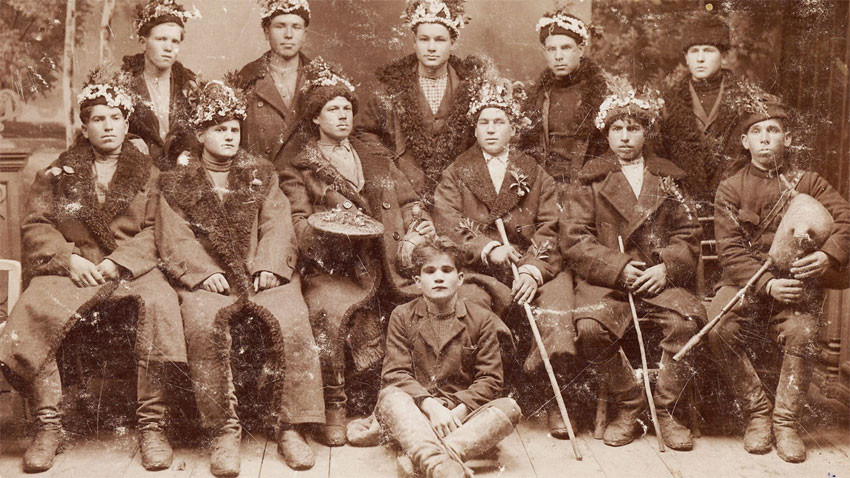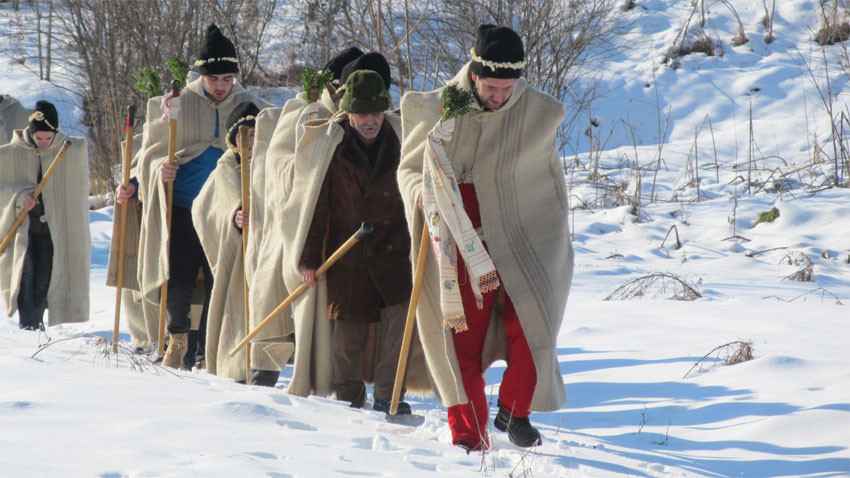
Even before the adoption of Christianity in Bulgarian lands and the celebration of the Nativity of Christ, the day after Christmas Eve used to hold a special place in the Bulgarian folk calendar – it was called Koleda (Christmas), Bozhich, Bozhik and was dedicated to the birth of the young God (Mlada Boga).
“The dinner is over and the table is cleaned. Midnight is nigh or what is known as the dead of night. The homeowner is out in the yard to oversee the cattle, and the young brides have put the Christmas ring-shaped buns and the krondir (a traditional ceramic pot) of wine on the table. This indicates that guests are expected. And they are the carol singers (koledari)... Once they used to announce the start of their walk around the village with a rifle shot. Everyone who was supposed to keep the fire burning, was on the alert and if there was a young maiden in the house they would awaken her to put on her best dress because her beloved would be among the band of carol singers”.

This depiction of one of the most authentic Bulgarian rituals belongs to the great Bulgarian ethnographer Dimitar Marinov who studied and documented a wealth of songs and customs in the years after Bulgaria’s Liberation from the Ottoman Domination in 1878. He put down on paper songs and rituals based on the accounts he heard from elderly men who used to be “stanenik” or leaders of the carol singers in their youth. The carol singer called “stanenik” was “the ruler of plenty of land and of a populous fellowship” and he was well versed in the custom and the characteristic songs that accompany it. And these songs are not few at all as each has its strict content and purpose. The leader of the carol singers is also a main figure in the custom, standing highest in the hierarchy, regarded as a representative of the higher powers, with a priestly role. Right after midnight on Christmas Eve, the carol singers gather in front of his home and sing the first song with blessings to him, urging him to come out and prepare to welcome the arriving Lord:
“Stane nine, Gospodine!
Bog se kani da ti doide,
I vaz boga sbor angeli.
Mozh’li boga da posreshtesh,
Da posreshtnesh, da nagostish”.
In this song,which is emblematic of the custom and is performed as a dialogue, the “star stareyo” (stanenik) respond in return that he is ready because the Lord has given him “barns full of grain, nine barrels of sparkling wine, and a tenth barrel full of strong brandy”...

The leader offers food to the carol singers as all the other villagers will do in the festive night. If the village is large, the leader divides the young men into groups (cheti, kudi), puts a chief to each group and marks their route around the village. Each of the young lads strives to be selected to go to the neighbourhood where his beloved lass lives, but they should not be part of the group that will go to their own home. One of the special ritual signs of the stanenik is a branched tree perched on a ring-shaped bun decorated with gilded apples, greenery, red threads, coins – this is the ritual presence of the World Tree. Each carol singer must carry a shepherd’s crook(krivak) and adorn his fur hat (kalpak) with wreaths of greenery, beads, etc. The young lads make their carolling round from midnight to sunrise on Christmas Day - the time of the evil creatures, vampires and goblins. Their songs are believed to have the power to banish these dark powers away in order to protect the visible and invisible world on the first night of the Young God. In every home facing east, the leader of the carol singers utters a Christmas blessing. The lads sing songs to the homeowner's glory and extend good wishes for well-being to every family member. By uttering these spells, they perform verbal magic for fertility, health, marriage. Therefore, these blessings and ritual formulas can only be performed during the ritual of carol singing (and before that during the training of the carollers).

According to researchers, this was an ancient practice for male initiation – with the exception of their leader, all the carol singers are either unwedded young lads or young men who just got married. The custom also bears a connection to the afterlife. Many Christmas carols depict the long road travelled by carol singers. Another curious detail is that the merry band of lads moves from west to east in its night-time singing round - according to the deep meaning of the popular belief, this is regarded as a movement from death to life, from darkness to light.
Some members of the groups of carol singers disguise as certain characters – an old man and an old woman who play a pantomime with jumps. In some places, the carol singers are followed by the so-called “tail” – lads helping to carry the gifts. The boy who collects the ring-shaped buns is called “trohober” (picking the breadcrumbs), the lad called “magare” (donkey) brings the lard and the flat sausages, and the “mache” (kitten) enacts merry jokes and meows like a cat.

Work is forbidden on Christmas Day as everyone goes to church for the solemn festive service. All residents of the village gather afterwards in the village square for the traditional chain dance. The ring-shaped buns that the carol singers collected and which were made by the young maidens as a gift to their beloved are sold at an auction. Every young lad seeks to buy out the bun made by his beloved girl. The Christmas merriment ends around a big table laid out in the home of the carol singers’ leader where everyone is invited. In some places, the carol singers bring wine to the village square called “kolashko” and offer it to the gathered men. Throughout the day, one can hear the blessings of the carol singers for health, fertility and prosperity resounding all over the village.
English Rossitsa Petcova
Photos: BGNESThe Philip Koutev National School of Folk Arts is not just any school - it is a talent laboratory. It is the first school not only in Bulgaria but in the Balkans for professional study of folklore. It is located in the heart of the beautiful town of..
Scientists from the Sorbonne will study the cultural heritage preserved in the Regional Ethnographic Open-Air Museum "Etar" , informs public broadcaster BNT. In March this year the French scientists together with experts of REOM "Etar" will study elements..
The day of St. Tryphon (1 February old style, 14 February new style) is celebrated by vine growers, falconers and gardeners in Bulgaria. Trifon Zarezan comes around with vine pruning and wine drinking St. Tryphon is believed to help..

+359 2 9336 661
